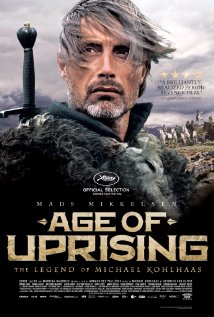
MICHAEL KOLLHAAS/AGE OF UPRISING: THE LEGEND OF MICHAEL KOLHAAS.
France, 2013, 122 minutes, Colour.
Mads Mikkelsen, Melusine Mayance, Delphine Chuillot, David Kross, Bruno Ganz, Denis Lavant, Roxanne Duran, David Bennent, Sergi Lopez.
Directed by Arnaaud Des Pallieres.
Michael Kollhaas is a horse trader in 16th century France. He is barred from passing through territory with his horses by a local count, acting in the name of the Princess. He defies the count although surrendering two of his black horses. He intends to recover them.
He is a family man but discovers his wife murdered and starts on a journey of principles rather than vengeance. Along the way, many disgruntled citizens join him so that eventually he has an army. He is visited by the Princess, confronts the count, but is arrested and executed.
The film re—creates the 16th century countryside and villages. And the film has the benefit of Mads Mikkelsen in the central role, a performance not dissimilar from many of his others but distinctive nonetheless.
1. A saga of France in the 16th century, adapted from a German novel and transferred from Germany to France? The novel written at the beginning of the 19th century? The adaptation? Imagination?
2. The French locations, the villages, the mountains, castles, the forests? The musical score, stirring and atmospheric?
3. The title, the focus on Michael, the presence and performance in Mads Mikkelsen? As an ordinary citizen, hard done by, assertive, husband and father? Rebel, leader of an uprising?
4. The re-creation of the period, costumes and decor, castles and interiors, ordinary homes? The arms? The soldiers on the move, in the countryside, the seasons?
5. Michael, his farm, the horses, his domestic life? Refused passage by the count, the legal action by the count, the taking of the black horses, treatment? Michael taking the other horses to market, the sales? Determined to get his black horses back? The encounter with the government, his friendship, support?
6. The sequences at home, the sexual relationship with his wife? His caring for the children?
7. Cesar, his loyalty, his treatment, humiliation, violence?
8. The Princess, the presence, her role, sister of the king, legislation, the fines and obligations? A meeting with Michael, wanting to see him, his troops, understand his principles, agreeing with him, the change of legislation?
9. Michael, the life and death of his wife, his demanding justice rather than vengeance?
10. Michael, moving to see the count, finding people in villages and the countryside who were rebelling against hardships, their joining him, his having an army? Travelling, seeing the Princess, feeling that he had been heard, his discussions with the government, the Governor not being able to support him?
11. The fights, the soldiers, the battle sequences, strategies and tactics?
12. His horses back? After the false black horses? Justice being done?
13. Michael and his children, his son, presence?
14. The importance of the chaplain, the religious dimensions, Michael reading the Bible in the vernacular, this being suspicious at the time, silent Protestant revolt? Michael and his religious beliefs, the long talk with the theologist, the discussions on principles, the personality of the theologist, Michael going to confession, his past sins, but his principle of carrying on with his crusade?
15. The finale, Michael sending people back to safety, the judgement on him, his sincerity, his principles, his being executed?